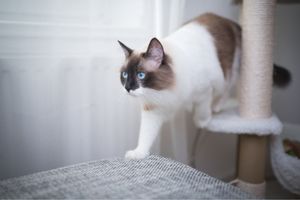Although blindness occurs more often in dogs than cats, it does happen. Despite requiring extra safety precautions around the home, blind cats can lead happy, fulfilling lives. It’s unfortunately common for older cats to suffer vision loss, just as humans begin to experience gradual vision loss as they age and often require reading glasses. This normal change in cats, referred to as nuclear sclerosis, causes a hazy appearance of their eyes and lessens their ability to focus on close objects. Other cats may suffer complete vision loss if they’ve experienced something more than nuclear sclerosis, such as cataracts, injury, hypertension, or retinal degeneration. To keep your blind or vision-impaired cat safe and happy, be sure to follow some simple household practices that will ensure they don’t injure themselves or become disoriented.
Ways to keep your blind cat safe around the home include:
Keep Their Food in the Same Place
A blind feline will become distressed if they can’t locate their cat food, so be sure to keep their bowl in one place and avoid relocating it. The same applies to their water bowl and litter box. These are all essentials for your cat, and they should be able to immediately locate them when needed.
Avoid Startling Noises and Unexpected Touch
Blind cats startle easily since they’re more sensitive to sounds and touch as their primary senses. Always speak to your cat before touching them or picking them up, and consider a warning of some kind when other pets in the home are nearby. A bell attached to the collars of other pets will alert your blind cat that they’re in the immediate area and will prevent them from being startled if the other pet approaches to play.

Don’t Rearrange Furniture
Blind pets become very accustomed to where things are located around the house. Despite blindness, they will continue to leap from the floor to the counter and the couch to the chair based on memory. Moving furniture could result in a scary leap to the hard floor instead of the expected soft landing on the couch.
Avoid Carrying Your Cat
Carrying a blind cat from one spot to another can lead to confusion, as they’ll no longer know exactly where they are in the home. Allow your cat to navigate independently so they remain acclimated to their surroundings, and use your voice to guide them if you want them in a specific room. If your cat does get disoriented, guide them with your voice to a familiar spot, such as their food bowl or favorite lounging spot, and they’ll readjust quickly.
Hazard Proof Your Home
Since blind cats will continue to leap around the house based on memory, it’s essential to make sure that hazards aren’t left lying around the home.
When you have a blind cat, ensure you hazard proof in the following way:
- Make sure there’s nothing sharp on the kitchen counter or table.
- Be sure to keep toilet lids down and pools or hot tubs covered.
- Block access to stairways.
These small efforts will keep your cat safe from common household hazards, as well as other pets that don’t suffer from blindness or vision loss.
The Humane Society of the United States offers additional guidance and insight on caring for blind pets and keeping them safe. Contact us if you would like to learn more about keeping your blind cat safe and happy.
